Evaluation of Subsidy Programmes
This research group develops the scientific foundations for causal impact analysis of policy interventions within the European Union, with a particular focus on place-based policies. Despite significant public spending on such programmes in many developed economies, there is limited evidence on their effectiveness and efficiency.
Our approach integrates three key dimensions: first, the systematic use of administrative funding data and legislative documents; second, the application of advanced methods in policy impact evaluation; and third, the exchange of knowledge among researchers, policymakers, public administration, and civil society. Without this integration, research risks becoming either overly abstract or disconnected from the institutional and legal realities of policy implementation. By combining these elements, we create robust research designs grounded in real data and legal frameworks.
This approach allows us to generate evidence-based insights that contribute to better informed decision-making—not only in politics but also within civil society. The findings of our work have contributed to the revision and improvement of existing subsidy programmes. The research group is closely embedded in the activities of the Centre for Evidence-based Policy Advice (CEP), ensuring both scientific rigor and practical relevance. In doing so, we embody the leitmotif of the Leibniz Association: theoria cum praxi.
Research Cluster
Economic Dynamics and StabilityYour contact

- Department Centre for Evidence-based Policy Advice
EXTERNAL FUNDING
09.2019 ‐ 09.2022
Establishing Evidence-based Evaluation Methods for Subsidy Programmes in Germany (EVA-KULT)
The project aims at expanding the Centre for Evidence-based Policy Advice at the Halle Institute for Economic Research (IWH-CEP).
01.2018 ‐ 12.2020
Networked growth - Innovative Saxony-Anhalt through digital business models (Competence Center 4.0)
01.2017 ‐ 12.2018
Political Participation in Eastern Germany
12.2015 ‐ 11.2018
Socio-economic Effects of Research on Innovative Approaches for POC Diagnostics
Part of the EXASENS project. Coordinated by the Leibniz Institute of Photonic Technology (IPHT) in Jena, nine Leibniz institutes are working together on researching point-of-care (POC) technology for the prediction and diagnosis of chronic inflammatory respiratory diseases. See press release.
02.2017 ‐ 02.2018
The Importance of Non-University Research Institutions for the Development of Firms and Regions (Be_For_Reg-Projekt)
01.2015 ‐ 12.2016
Evaluation of the "Joint Task 'Improving the Regional Economic Structure'" in the Federal State of Saxony-Anhalt
Refereed Publications
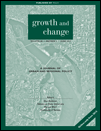
Actors and Interactions – Identifying the Role of Industrial Clusters for Regional Production and Knowledge Generation Activities
in: Growth and Change, No. 2, 2014
Abstract
This paper contributes to the empirical literature on systematic methodologies for the identification of industrial clusters. It combines a measure of spatial concentration, qualitative input–output analysis, and a knowledge interaction matrix to identify the production and knowledge generation activities of industrial clusters in the Federal State of Saxony in Germany. It describes the spatial allocation of the industrial clusters, identifies potentials for value chain industry clusters, and relates the production activities to the activities of knowledge generation in Saxony. It finds only a small overlap in the production activities of industrial clusters and general knowledge generation activities in the region, mainly driven by the high-tech industrial cluster in the semiconductor industry. Furthermore, the approach makes clear that a sole focus on production activities for industrial cluster analysis limits the identification of innovative actors.
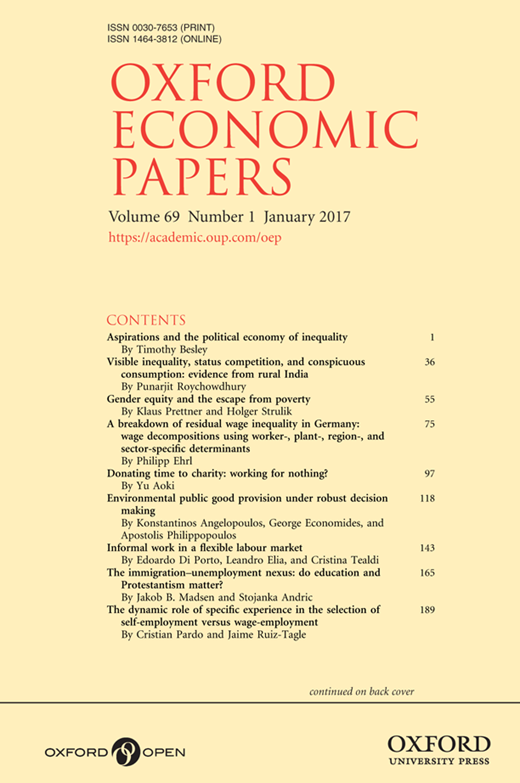
Non-union Worker Representation, Foreign Owners, and the Performance of Establishments
in: Oxford Economic Papers, No. 1, 2014
Abstract
Using German establishment data, this study provides the first econometric analysis on the interaction of establishment-level codetermination and foreign owners. Works councils are associated with higher productivity in domestic-owned establishments while they are associated with lower productivity in foreign-owned establishments. Our results conform to the notion that foreign ownership can involve strong tensions with the institutional patterns of the host country.
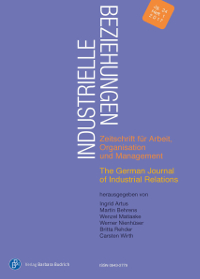
Adjustments in the Use of Temporary Agency before and during the 2008/2009 Economic Crisis
in: Industrielle Beziehungen, No. 1, 2014
Abstract
Der Anstieg in der Leiharbeitsnutzung in Deutschland bis zur Wirtschaftskrise der Jahre 2008 und 2009 war geprägt durch die verstärkte Nutzung in größeren Industriebetrieben und vollzog sich in erster Linie entlang der intensive margin, also durch eine erhöhte Leiharbeitsintensität in den Nutzerbetrieben. Diese Vorgänge können mit transaktionskostentheoretischen Argumenten und gestiegenem internationalen Wettbewerbsdruck erklärt werden, und sie deuten auf eine gestiegene Produktivität in den Nutzerbetrieben hin. Der drastische Rückgang in der Leiharbeitsnutzung während der Krise betraf vor allem Exporteure und größere Industriebetriebe und vollzog sich primär entlang der extensive margin. Die Beschäftigungschancen im Leiharbeitssektor hingen in besonders starkem Maße von der internationalen Nachfrage nach deutschen Industriegütern ab.
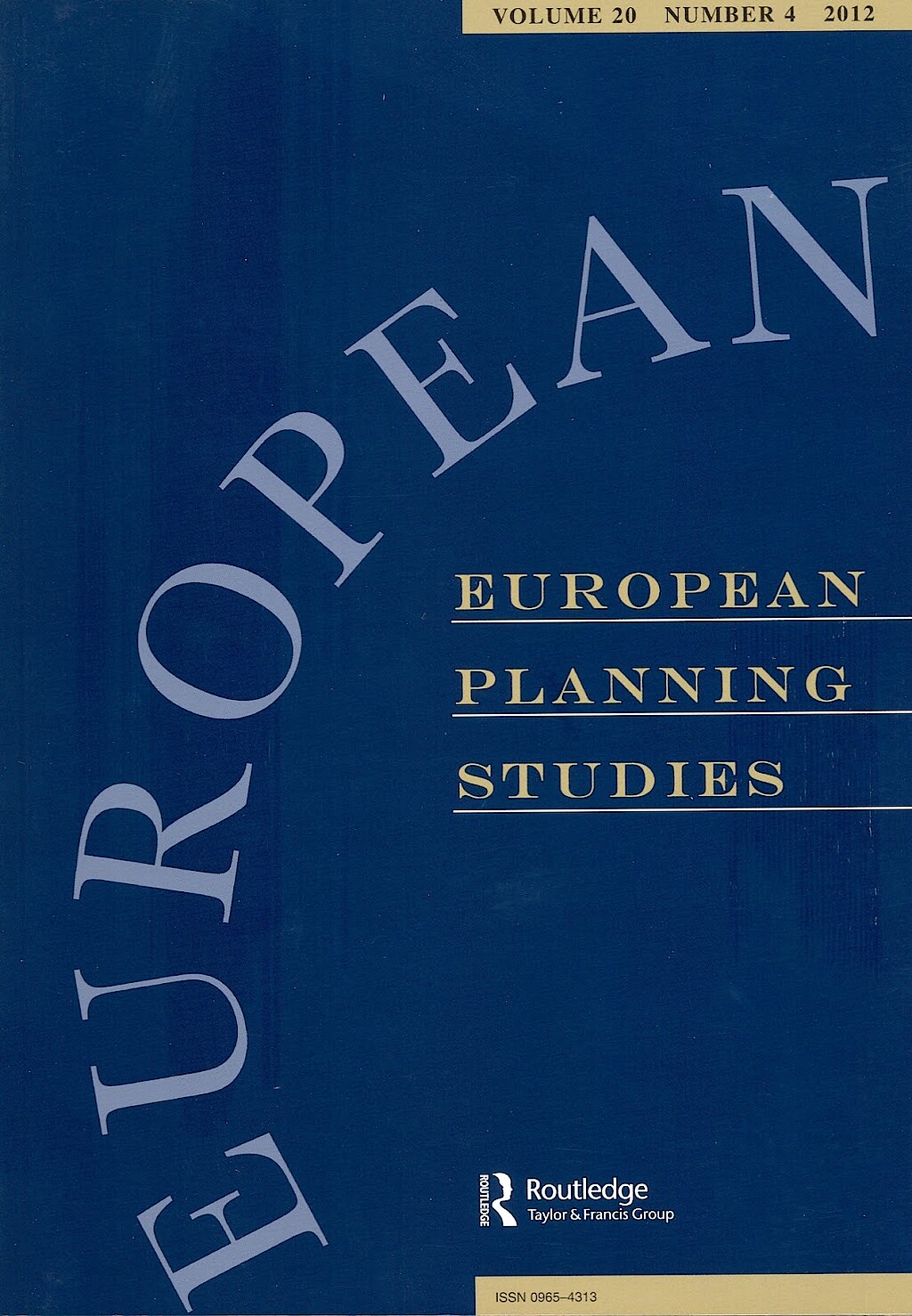
Guest Editorial: Which Regions Benefit from Emerging Industries? Guest Editorial
in: European Planning Studies, No. 11, 2013
read publication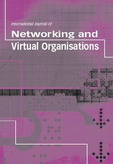
The Impact of R&D Collaboration Networks on the Performance of Firms and Regions: A Meta-Analysis of the Evidence
in: International Journal of Networking and Virtual Organisations, No. 4, 2013
Abstract
Wissensintensive Interaktionen sind mit einer Reihe von Vor- und Nachteilen für die beteiligten Akteure verbunden. Deshalb hat sich ein Literaturstrang entwickelt, welcher der Fragestellung nachgeht, wie sich FuE-Kooperationen auf die Leistungsfähigkeit von Firmen und Regionen auswirken. Diese Studien kommen zu unterschiedlichen Ergebnissen. Das Papier versucht die verschiedenen Ergebnisse der Literatur zusammenzufassen. Ein weiteres Ziel ist es, die in der Literatur verwendeten Methoden zur Bearbeitung der Fragestellung kritisch zu diskutieren. Zudem geht das Papier der Frage nach, inwiefern die in der Literatur verwendeten Methoden und Ansätze die Ergebnisse der Studien beeinflussen. Zur Bearbeitung dieser Fragestellungen wird eine Metaanalyse der relevanten Literatur durchgeführt. Dabei wird gezeigt, dass FuE-Kooperationen einen positiven Effekt auf die Leistungsfähigkeit von Firmen und Regionen haben. Zudem gibt es starke Evidenz dafür, dass die verwendeten Methoden und Ansätze die Ergebnisse der Studien beeinflussen.
Working Papers
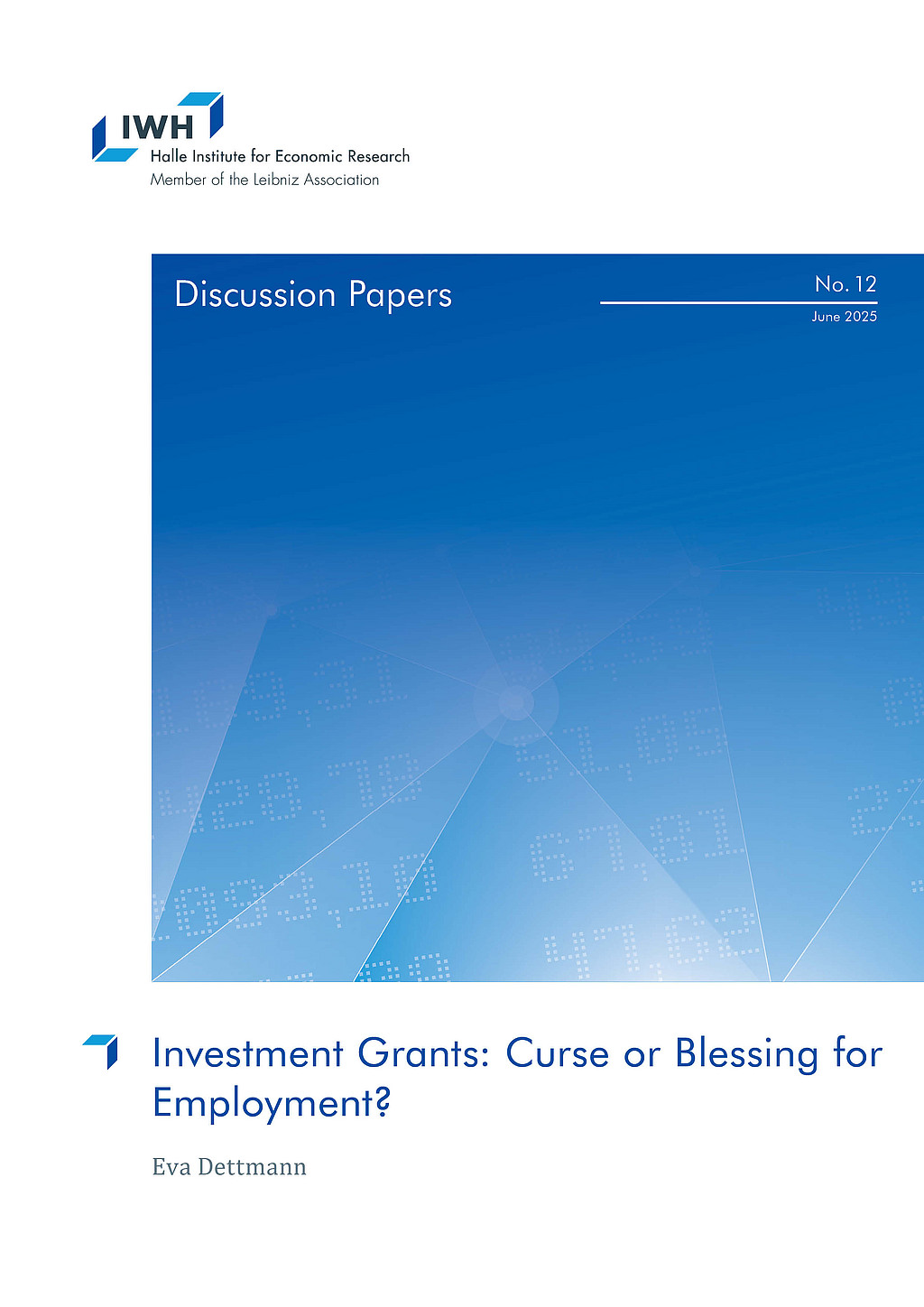
Investment Grants: Curse or Blessing for Employment?
in: IWH Discussion Papers, No. 12, 2025
Abstract
<p>In this study, establishment-level employment effects of investment grants in Germany are estimated. In addition to the quantitative effects, I provide empirical evidence of funding effects on different aspects of employment quality (earnings, qualifications, and job security) for the period 2004 to 2020. The database combines project-level treatment data, establishment-level information on firm characteristics and employee structure, and regional information at the district-level. For the estimations, I combine the difference-in-differences approach of Callaway and Sant’Anna (2021) with ties matching at the cohort level. The estimations yield positive effects on the number of employees, but point to contradicting effects of investment grants on different aspects of employment quality.</p>
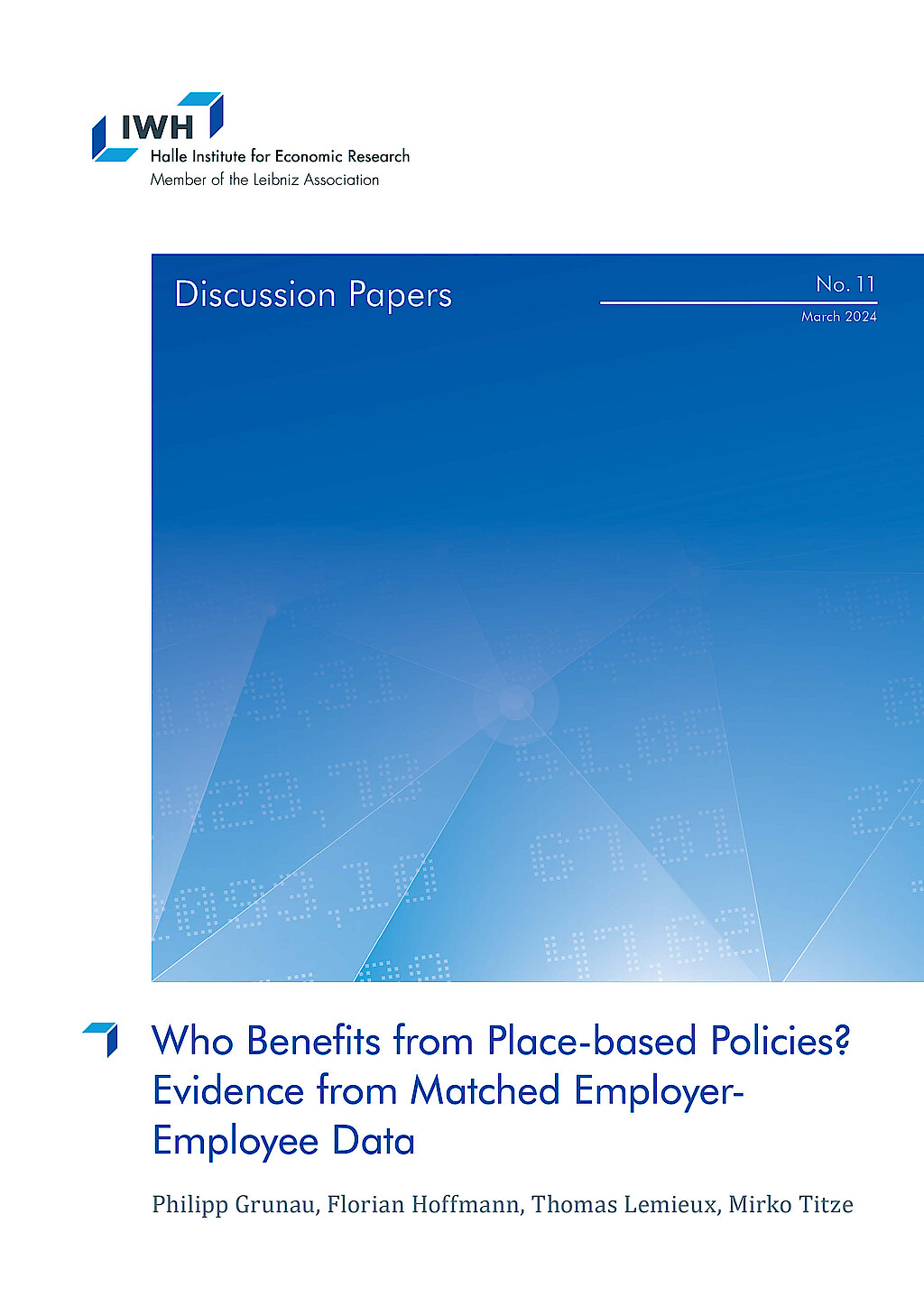
Who Benefits from Place-based Policies? Evidence from Matched Employer-Employee Data
in: IWH Discussion Papers, No. 11, 2024
Abstract
<p>We study the granular wage and employment effects of a German place-based policy using a research design that leverages conditionally exogenous EU-wide rules governing program parameters at the regional level. The place-based program subsidizes investments to create jobs with a subsidy rate that varies across labor market regions. The analysis uses matched data on the universe of establishments and their employees, establishment-level panel data on program participation, and regional scores that generate spatial discontinuities in program eligibility and generosity. Spatial spillovers of the program linked to changing commuting patterns can be assessed using information on place of work and place of residence, a unique feature of the data. These rich data enable us to study the incidence of the place-based program on different groups of individuals. We find that the program helps establishments create jobs that disproportionately benefit younger and less-educated workers. Funded establishments increase their wages but, unlike employment, wage gains do not persist in the long run. Employment effects estimated at the local area level are slightly larger than establishment- level estimates, suggesting limited economic spillover effects. On the other hand, spatial spillovers are large as over half of the employment increase comes from commuters. Using subsidy rates as an instrumental variable for actual subsidies indicates that it costs approximately EUR 25,000 to create a new job in the economically disadvantaged areas targeted by the program.</p>
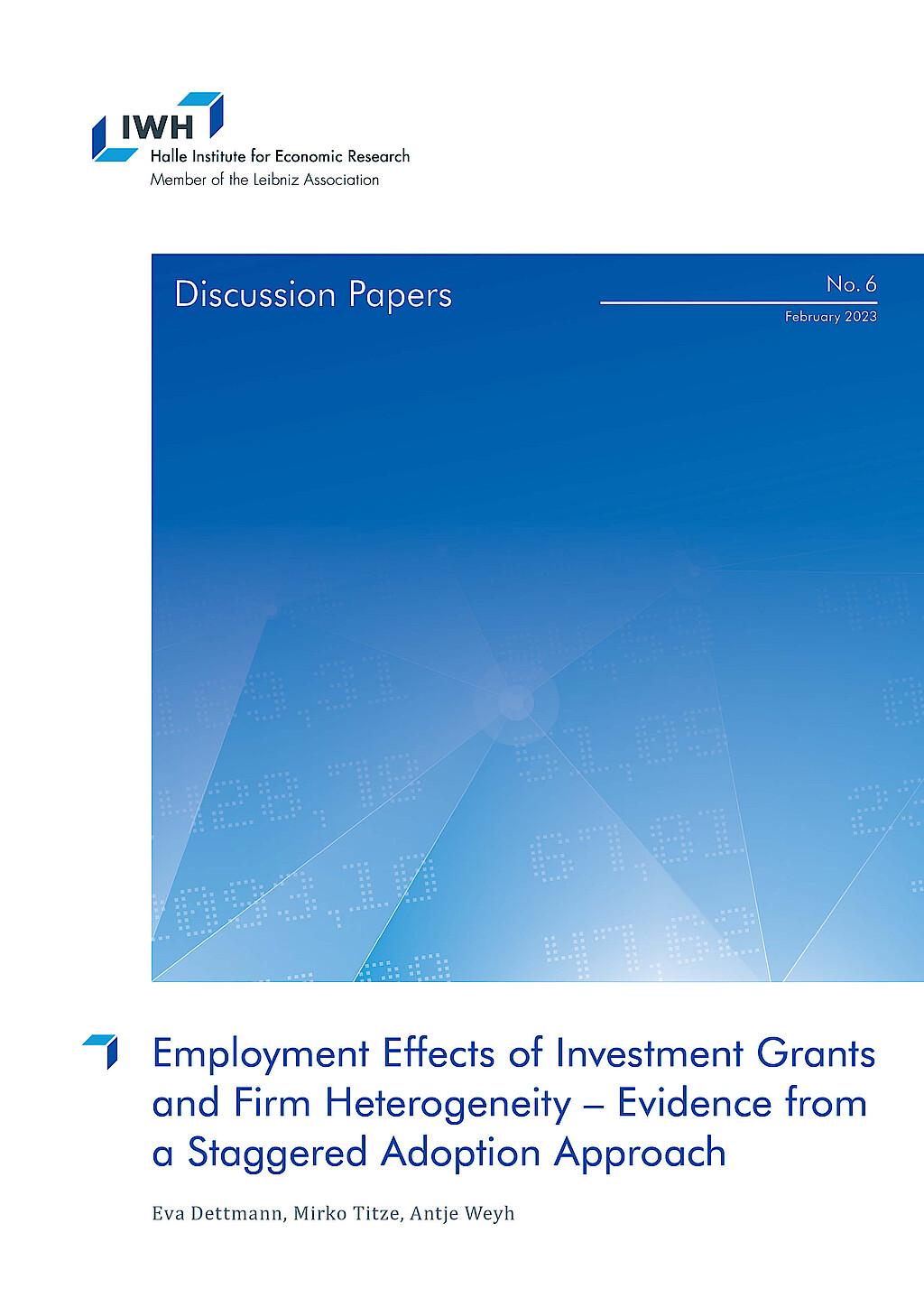
Employment Effects of Investment Grants and Firm Heterogeneity – Evidence from a Staggered Adoption Approach
in: IWH Discussion Papers, No. 6, 2023
Abstract
<p>This study estimates the firm-level employment effects of investment grants in Germany. In addition to the average treatment effect on the treated, we examine discrimination in the funding rules as potential source of effect heterogeneity. We combine a staggered difference-in-differences approach that explicitly models variations in treatment timing with a matching procedure at the cohort level. The findings reveal a positive effect of investment grants on employment development in the full sample. The subsample analysis yields strong evidence for heterogeneous effects based on firm characteristics and the economic environment. This can help to improve the future design of the program.</p>
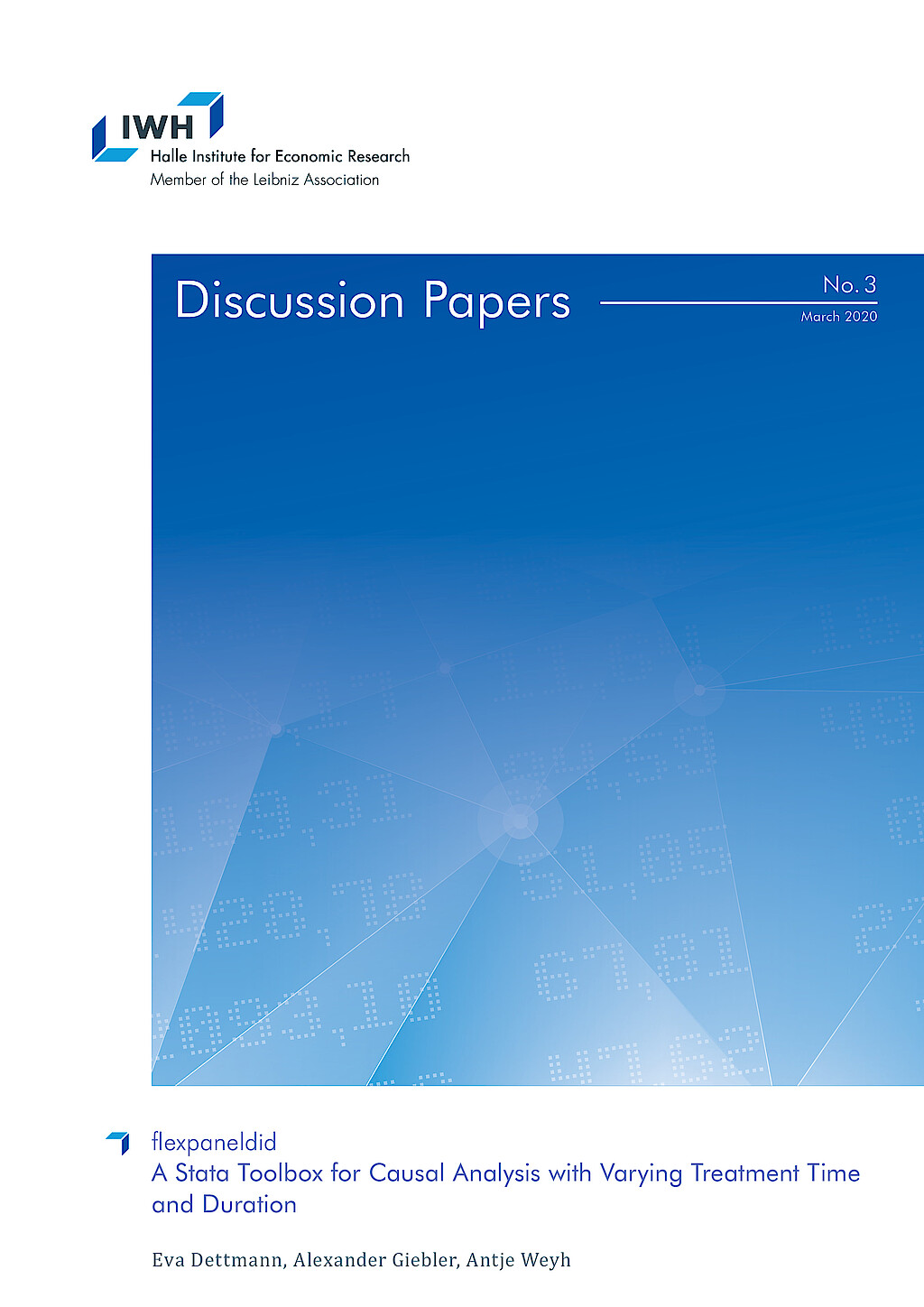
flexpaneldid: A Stata Toolbox for Causal Analysis with Varying Treatment Time and Duration
in: IWH Discussion Papers, No. 3, 2020
Abstract
The paper presents a modification of the matching and difference-in-differences approach of Heckman et al. (1998) for the staggered treatment adoption design and a Stata tool that implements the approach. This flexible conditional difference-in-differences approach is particularly useful for causal analysis of treatments with varying start dates and varying treatment durations. Introducing more flexibility enables the user to consider individual treatment periods for the treated observations and thus circumventing problems arising in canonical difference-in-differences approaches. The open-source flexpaneldid toolbox for Stata implements the developed approach and allows comprehensive robustness checks and quality tests. The core of the paper gives comprehensive examples to explain the use of the commands and its options on the basis of a publicly accessible data set.
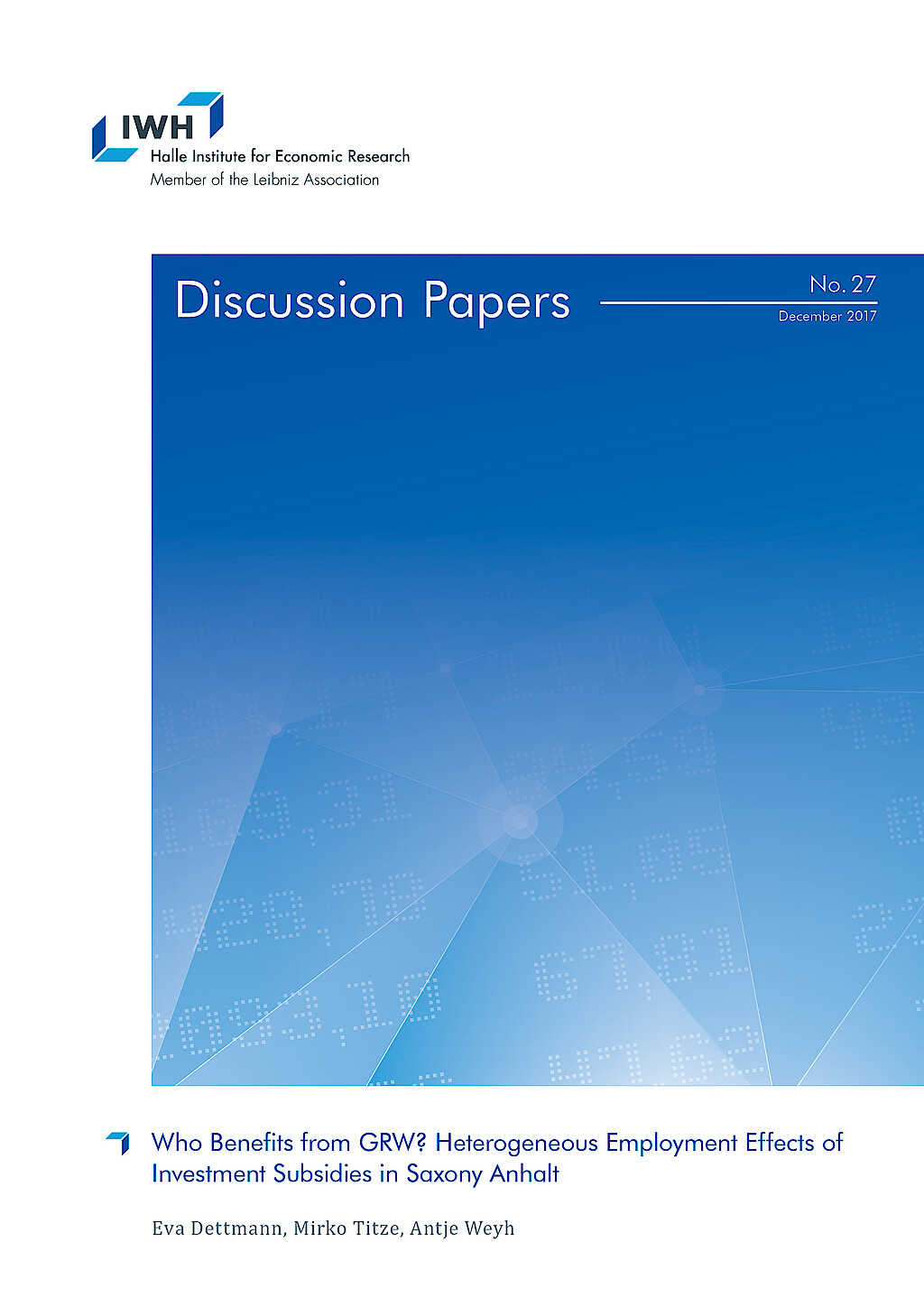
Who Benefits from GRW? Heterogeneous Employment Effects of Investment Subsidies in Saxony Anhalt
in: IWH Discussion Papers, No. 27, 2017
Abstract
The paper estimates the plant level employment effects of investment subsidies in one of the most strongly subsidized German Federal States. We analyze the treated plants as a whole, as well as the influence of heterogeneity in plant characteristics and the economic environment. Modifying the standard matching and difference-in-difference approach, we develop a new procedure that is particularly useful for the evaluation of funding programs with individual treatment phases within the funding period. Our data base combines treatment, employment and regional information from different sources. So, we can relate the absolute effects to the amount of the subsidy paid. The results suggest that investment subsidies have a positive influence on the employment development in absolute and standardized figures – with considerable effect heterogeneity.













